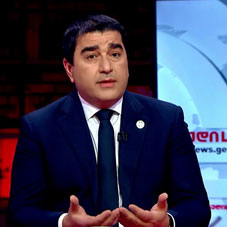
Papuashvili Criticizes Germany's Sanctions Policy and Selective Enforcement
By Liza Mchedlidze
Friday, April 18, 2025
Shalva Papuashvili, the Speaker of the Parliament of Georgia, has raised concerns about the way sanctions and visa restrictions are being used, arguing that they have become tools for political vendettas rather than a genuine commitment to upholding legal principles.
Papuashvili's comments came in response to a recent statement by Peter Fischer, the German Ambassador to Georgia. Fischer explained that sanctions were imposed to prevent human rights violators from entering Germany. In his Facebook post, Papuashvili questioned why the German government had not banned Zurab Adeishvili, a former Georgian official, from entering the country despite his involvement in multiple human rights abuses.
Papuashvili referred to Adeishvili as "one of the main architects of a system of torture and racketeering" in Georgia. He went on to point out that just months ago, Adeishvili visited Germany officially, meeting with officials as a representative of the Ukrainian government, and was even seen in the Bundestag. This, according to Papuashvili, is a contradiction of Germany's stance on human rights violators.
The Georgian Parliament Speaker listed several of Adeishvili's criminal convictions, including the kidnapping and torture of opposition politician Koba Davitashvili, the unlawful seizure of businesses and media outlets, and his attempt to bankrupt a bank. Despite these actions, Papuashvili argued, the German government allowed Adeishvili to enter the country, which he believes shows that sanctions and visa restrictions are being applied inconsistently.
"If Germany truly rejected human rights violators, they would not have hosted Adeishvili or allowed him into the country," Papuashvili wrote, stressing that this is a clear example of how sanctions have been politicized. He concluded by stating that such actions are far removed from the core European legal values of fairness and impartiality.

